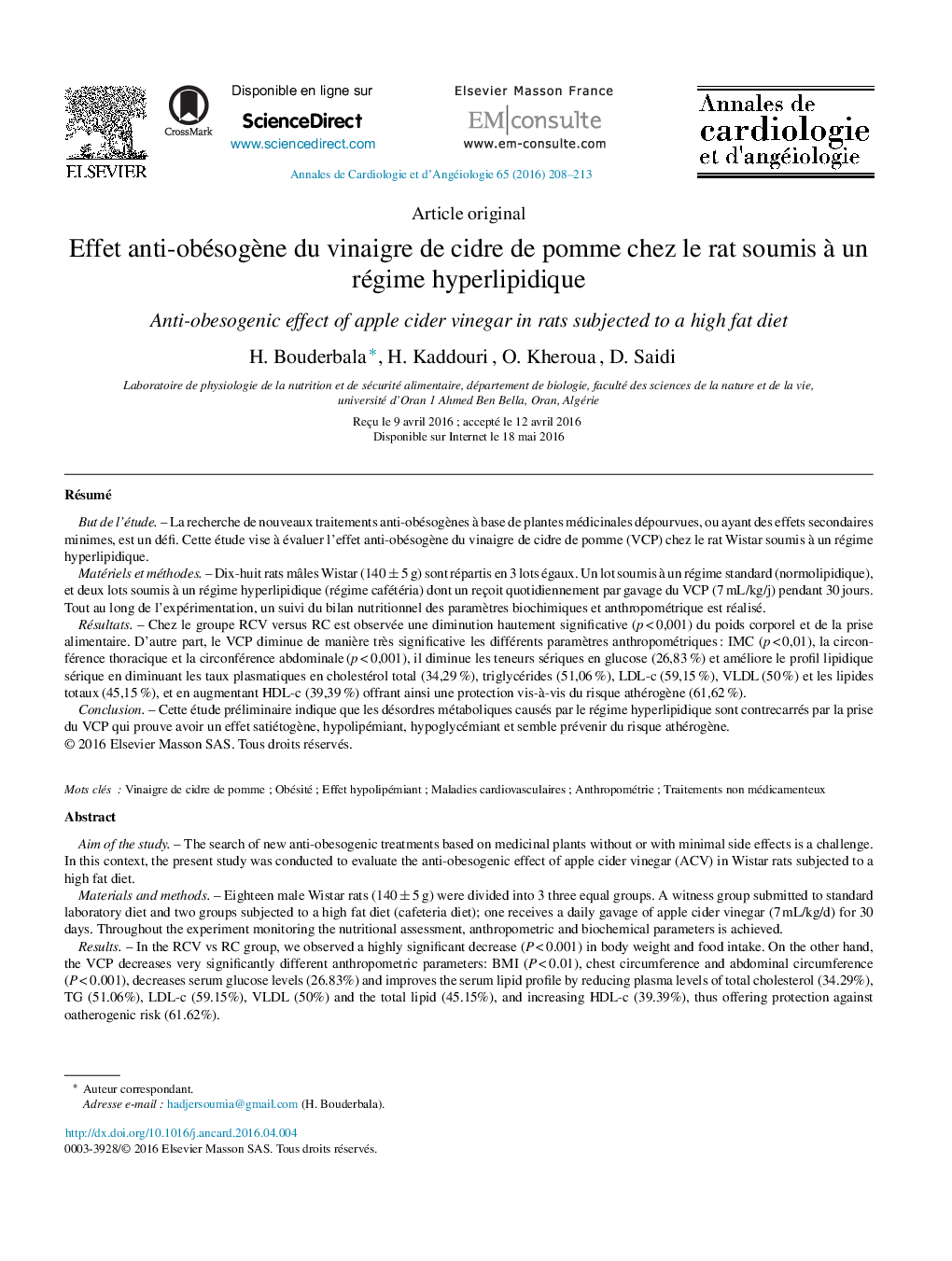| Article ID | Journal | Published Year | Pages | File Type |
|---|---|---|---|---|
| 2868436 | Annales de Cardiologie et d'Angéiologie | 2016 | 6 Pages |
RésuméBut de l’étudeLa recherche de nouveaux traitements anti-obésogènes à base de plantes médicinales dépourvues, ou ayant des effets secondaires minimes, est un défi. Cette étude vise à évaluer l’effet anti-obésogène du vinaigre de cidre de pomme (VCP) chez le rat Wistar soumis à un régime hyperlipidique.Matériels et méthodesDix-huit rats mâles Wistar (140 ± 5 g) sont répartis en 3 lots égaux. Un lot soumis à un régime standard (normolipidique), et deux lots soumis à un régime hyperlipidique (régime cafétéria) dont un reçoit quotidiennement par gavage du VCP (7 mL/kg/j) pendant 30 jours. Tout au long de l’expérimentation, un suivi du bilan nutritionnel des paramètres biochimiques et anthropométrique est réalisé.RésultatsChez le groupe RCV versus RC est observée une diminution hautement significative (p < 0,001) du poids corporel et de la prise alimentaire. D’autre part, le VCP diminue de manière très significative les différents paramètres anthropométriques : IMC (p < 0,01), la circonférence thoracique et la circonférence abdominale (p < 0,001), il diminue les teneurs sériques en glucose (26,83 %) et améliore le profil lipidique sérique en diminuant les taux plasmatiques en cholestérol total (34,29 %), triglycérides (51,06 %), LDL-c (59,15 %), VLDL (50 %) et les lipides totaux (45,15 %), et en augmentant HDL-c (39,39 %) offrant ainsi une protection vis-à-vis du risque athérogène (61,62 %).ConclusionCette étude préliminaire indique que les désordres métaboliques causés par le régime hyperlipidique sont contrecarrés par la prise du VCP qui prouve avoir un effet satiétogène, hypolipémiant, hypoglycémiant et semble prévenir du risque athérogène.
Aim of the studyThe search of new anti-obesogenic treatments based on medicinal plants without or with minimal side effects is a challenge. In this context, the present study was conducted to evaluate the anti-obesogenic effect of apple cider vinegar (ACV) in Wistar rats subjected to a high fat diet.Materials and methodsEighteen male Wistar rats (140 ± 5 g) were divided into 3 three equal groups. A witness group submitted to standard laboratory diet and two groups subjected to a high fat diet (cafeteria diet); one receives a daily gavage of apple cider vinegar (7 mL/kg/d) for 30 days. Throughout the experiment monitoring the nutritional assessment, anthropometric and biochemical parameters is achieved.ResultsIn the RCV vs RC group, we observed a highly significant decrease (P < 0.001) in body weight and food intake. On the other hand, the VCP decreases very significantly different anthropometric parameters: BMI (P < 0.01), chest circumference and abdominal circumference (P < 0.001), decreases serum glucose levels (26.83%) and improves the serum lipid profile by reducing plasma levels of total cholesterol (34.29%), TG (51.06%), LDL-c (59.15%), VLDL (50%) and the total lipid (45.15%), and increasing HDL-c (39.39%), thus offering protection against oatherogenic risk (61.62%).ConclusionThis preliminary study indicates that the metabolic disorders caused by high fat diet (cafeteria) are thwarted by taking apple cider vinegar which proves to have a satiating effect, antihyperlipidemic and hypoglycemic effects, and seems prevent the atherogenic risk.
